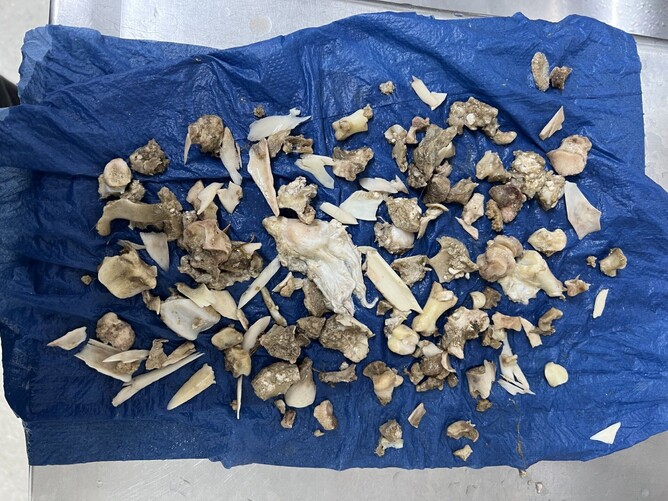Floyd is a 7-year-old labrador retriever and, like most in his breed, will eat anything, anytime, anywhere. While his owners do not feed him bones, he managed to find something ‘delicious’ while down at the beach.
A day or so after his beach escapade, Floyd started feeling very unwell and was unable to keep any food down. His owner also noticed he was straining to go to the toilet and was only passing a small amount of runny poo, so decided to bring him into West Coast Vets Hokitika to get checked out.
X-rays were taken and soon confirmed that a large amount of foreign material was in his stomach and intestines. His owners were informed, and he was taken straight to surgery.
Surgery on an already unwell animal comes with greater risk, as the body's systems are already fighting harder to compensate. There is also an increased risk of regurgitation and inhalation of the stomach contents, which can result in aspiration pneumonia.
Floyd spent 2.5 hours in surgery having all of the bone fragments in his stomach removed. He also had some smaller fragments throughout his intestines, but these were left to pass on their own.
After spending the night in hospital, Floyd was able to go home the following evening.
As many of the bone fragments were extremely sharp, there was some concern that his gastrointestinal tissues could rupture. He also had a large amount of internal contamination from the foreign material in his system, and was at risk of developing peritonitis, which would require a second surgery to resolve.
Fortunately, this was not the case for him, and he recovered well.
Floyd's case is a great example of the dangers associated with eating bones or other sharp objects. If you are concerned that your pet may have eaten something it shouldn't have, or they are showing signs of abdominal discomfort, it is always best to bring them into the clinic for a check over.

